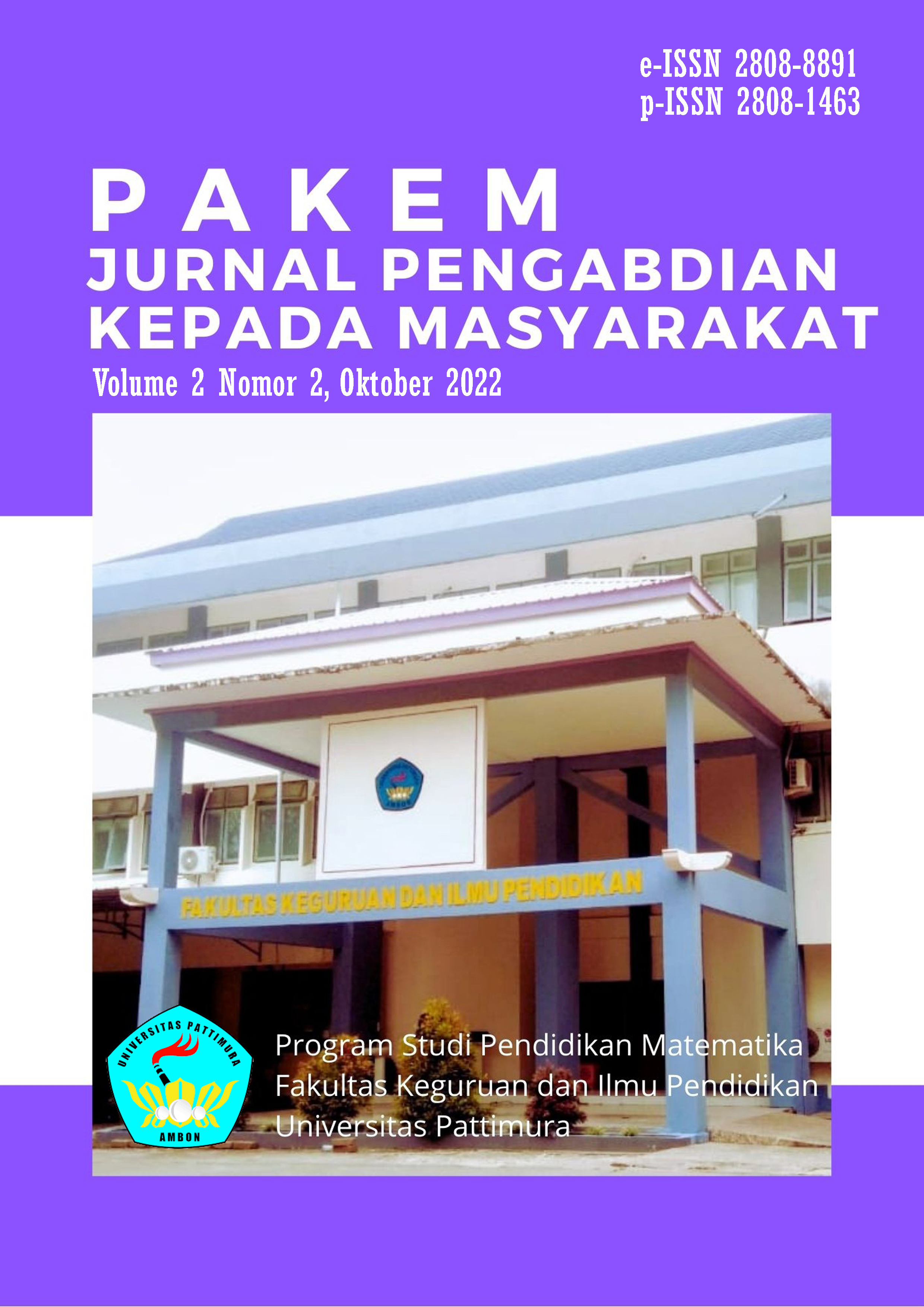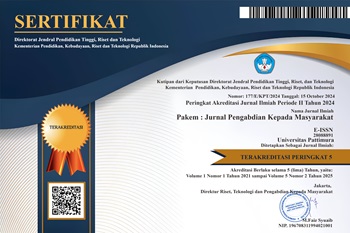PENDAMPINGAN GURU DALAM PEMAHAMAN KONSEP LOCAL WISDOM DAN PENYUSUNAN SOAL BERBASIS HOTS SEBAGAI UPAYA MENGEMBANGKAN BERPIKIR KREATIF SISWA SMP KOTA AMBON
Abstract
Assessment is an important component in the learning process. The type of assessment provided must be in accordance with the characteristics of the subject and learning outcomes. Teachers' understanding of science concepts and preparation of HOTS questions is needed in the process of assessing student achievement. Learning in the small islands of Maluku requires teacher strategies in understanding the concept of local wisdom and preparing HOTS-based science questions as an effort to develop students' creative thinking skills in understanding local wisdom concepts and preparing HOTS-based science questions to develop students' creative thinking skills. The training and mentoring is carried out with a classical in-service training pattern, and on the job learning. The results of the service show that the ability of teachers to analyze local wisdom materials varies and needs to be assisted because they do not understand developing HOTS questions, and are used as guidelines for the success of the learning process for local wisdom materials
Downloads
References
Alkhatib, O. J. (2019). A Framework for Implementing Higher-Order Thinking Skills (Problem-Solving, Critical Thinking, Creative Thinking, and Decision-Making) in Engineering Humanities. 2019 Advances in Science and Engineering Technology International Conferences, ASET 2019, January. https://doi.org/10.1109/ICASET.2019.8714232
Anderson, L. W., Krathwohl Peter W Airasian, D. R., Cruikshank, K. A., Mayer, R. E., Pintrich, P. R., Raths, J., & Wittrock, M. C. (2001). Taxonomy for_ Assessing a Revision 0F Bl00M’S Tax0N0My 0F Educati0Nal Objectives. https://www.uky.edu/~rsand1/china2018/texts/Anderson-Krathwohl - A taxonomy for learning teaching and assessing.pdf
Armus, R., Tumpu, M., Tamim, T., Affandy, N. A., Syam, M. A., & ... (2021). Pengembangan Sumber Daya Air (Issue January). https://books.google.com/books?hl=en&lr=&id=yS9CEAAAQBAJ&oi=fnd&pg=PA1&dq=rehab+bendung+alternatif+desain+biaya&ots=kggQZaGDcj&sig=oLgmCmtyCPjKo250MJ7KFHrFGUs
AS, I. S., Maharani, A. D., & Hidayat, Y. (2021). Development of Higher Order Thinking Skills (HOTS) Measurement Ability Instruments in Learning High School Biology. Ta’dib, 24(2), 8. https://doi.org/10.31958/jt.v24i2.3194
Braasch, J. L. G., Goldman, S. R., & Wiley, J. (2013). Influences of text and reader characteristics on learning from refutations in science texts. Journal of Educational Psychology, 105(3), 561–578. https://doi.org/10.1037/a0032627
Burns, M. (2011). Distance Education for Teacher Training: Modes, Models, and Methods. 338. http://idd.edc.org/sites/idd.edc.org/files/Distance Education for Teacher Training by Mary Burns EDC.pdf
Danielson, R. W., Sinatra, G. M., & Kendeou, P. (2016). Augmenting the Refutation Text Effect with Analogies and Graphics. Discourse Processes, 53(5–6), 392–414. https://doi.org/10.1080/0163853X.2016.1166334
Deschryver, M. D., & Yadav, A. (2015). Creative and Computational Thinking in the Context of New Literacies : Working with Teachers to Scaffold Complex Technology-Mediated Approaches to Teaching and Learning. Journal of Technology and Teacher Education, 23(3), 411–431.
Dewi, D. P., & Harjoyo. (2019). Manajemen Sumber Daya Manusia. In Unpam Press (Issue 1).
Dupri, Nazirun, N., & Candra, O. (2021). Creative Thinking Learning of Physical Education: Can Be Enhanced Using Discovery Learning Model? Journal Sport Area, 6(1), 37–47. https://doi.org/10.25299/sportarea.2021.vol6(1).5690
Goris, T. (2010). Students ’ Misconceptions in Science , Technology , and Engineering . ASEE Illinois/Indiana Section Conference, January 2010, 1–16.
Hossain, M. I. (2015). Teaching Productive Skills to the Students: A Secondary Level Scenario. A Thesis, 1–90. https://core.ac.uk/download/pdf/74352632.pdf
Kementerian Lingkungan Hidup dan Kehutanan Republik Indonesia. (2020). Status Lingkungan Hidup dan Kehutanan 2020. 14–50.
Kim, S., Raza, M., & Seidman, E. (2019). Improving 21st-century teaching skills: The key to effective 21st-century learners. Research in Comparative and International Education, 14(1), 99–117. https://doi.org/10.1177/1745499919829214
Kurniaman, O., & Noviana, E. (2017). Penerapan Kurikulum 2013 Dalam Meningkatkan Keterampilan, Sikap, Dan Pengetahuan. Primary: Jurnal Pendidikan Guru Sekolah Dasar, 6(2), 389. https://doi.org/10.33578/jpfkip.v6i2.4520
Kusek, J. Z., & Rist, R. C. (2004). 10 Steps to Result-Based Monitoring and Evaluation.
Lin, Y. W., Tseng, C. L., & Chiang, P. J. (2017). The effect of blended learning in mathematics course. Eurasia Journal of Mathematics, Science and Technology Education, 13(3), 741–770. https://doi.org/10.12973/eurasia.2017.00641a
Linda Thaba-Nkadimene, K. (2020). The influence of WhatsApp usage on collaborative pedagogy and social networking during teaching practice at a rural university in South Africa. Journal of African Education, S1(1), 5–23. https://doi.org/10.31920/2633-2930/2020/s1n1a1
Lodge, J. M., Kennedy, G., Lockyer, L., Arguel, A., & Pachman, M. (2018). Understanding Difficulties and Resulting Confusion in Learning: An Integrative Review. Frontiers in Education, 3(June), 1–10. https://doi.org/10.3389/feduc.2018.00049
Miterianifa, M., Ashadi, A., Saputro, S., & Suciati, S. (2021). Higher Order Thinking Skills in the 21st Century: Critical Thinking. June. https://doi.org/10.4108/eai.30-11-2020.2303766
Musingafi, M. C. C., & Rugonye, S. (2014). The Role of Cooperative Learning in the Teaching of Community and Developmental Subjects: The Case of Teaching History at Secondary School Level. Asian Journal of Social Sciences, 1(2), 57–61.
Nehm, R. H., & Reilly, L. (2007). Biology majors’ knowledge and misconceptions of natural selection. BioScience, 57(3), 263–272. https://doi.org/10.1641/B570311
OECD. (2019). PISA 2021 creative thinking framework. Oecd, 53(9), 1689–1699. https://www.oecd.org/pisa/publications/PISA-2021-creative-thinking-framework.pdf
Paschalidou, K., Salta, K., & Koulougliotis, D. (2021). Systems Thinking and Green Chemistry Education. 186(September).
Pramana, C., Chamidah, D., Suyatno, S., Renadi, F., & Syaharuddin, S. (2021). Strategies to Improved Education Quality in Indonesia: A Review. Turkish Online Journal of Qualitative Inquiry (TOJQI), 12(3), 1977–1994.
Reyes-García, V., Fernández-Llamazares, Á., Aumeeruddy-Thomas, Y., Benyei, P., Bussmann, R. W., Diamond, S. K., García-del-Amo, D., Guadilla-Sáez, S., Hanazaki, N., Kosoy, N., Lavides, M., Luz, A. C., McElwee, P., Meretsky, V. J., Newberry, T., Molnár, Z., Ruiz-Mallén, I., Salpeteur, M., Wyndham, F. S., … Brondizio, E. S. (2022). Recognizing Indigenous peoples’ and local communities’ rights and agency in the post-2020 Biodiversity Agenda. Ambio, 51(1), 84–92. https://doi.org/10.1007/s13280-021-01561-7
Sewagegn, A. A. (2020). Learning objective and assessment linkage: Its contribution to meaningful student learning. Universal Journal of Educational Research, 8(11), 5044–5052. https://doi.org/10.13189/ujer.2020.081104
Staff Development Center Wayamba University of Sri Lanka Improving Teaching in HigherEducation Through Effective Assessment Selected Topics Edited by (Issue April 2010). (2014).
Stehle, S. M., & Peters-Burton, E. E. (2019). Developing student 21st Century skills in selected exemplary inclusive STEM high schools. International Journal of STEM Education, 6(1), 1–15. https://doi.org/10.1186/s40594-019-0192-1
Sutarto, S., Sari, D. P., & Fathurrochman, I. (2020). Teacher strategies in online learning to increase students’ interest in learning during COVID-19 pandemic. Jurnal Konseling Dan Pendidikan, 8(3), 129. https://doi.org/10.29210/147800
Syarif, A., Tomoliyus, M., & Kushartanti, B. M. W. (2019). The Implementation of 2013 Curriculum in Elementary Schools. January. https://doi.org/10.2991/yishpess-cois-18.2018.22
Zakiyah, I., Widodo, W., & Tukiran, T. (2019). Implementation of Predict-Observe-Explain (POE) Strategy to Reduce Misconception in Thermochemistry. International Journal for Educational and Vocational Studies, 1(7), 754–759. https://doi.org/10.29103/ijevs.v1i7.1757
Copyright (c) 2022 PAKEM : Jurnal Pengabdian Kepada Masyarakat

This work is licensed under a Creative Commons Attribution-NonCommercial-ShareAlike 4.0 International License.
Authors who publish with PAKEM: Jurnal Pengabdian Kepada Masyarakat agree to the following terms:
- Authors grant copyright to the journal and right of first publication with the work simultaneously licensed under a Creative Commons Attribution License (CC BY-NC-SA 4.0)
- Authors are able to enter into separate, additional contractual arrangements for the non-exclusive distribution of the journal's published version of the work (e.g., post it to an institutional repository or publish it in a book), with an acknowledgment of its initial publication in this journal.
- Authors are permitted and encouraged to post their work online (e.g., in institutional repositories or on their website) prior to and during the submission process, as it can lead to productive exchanges, as well as earlier and greater citation of published work.


.jpg)













